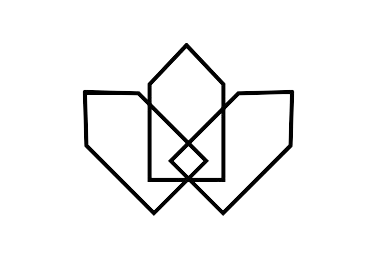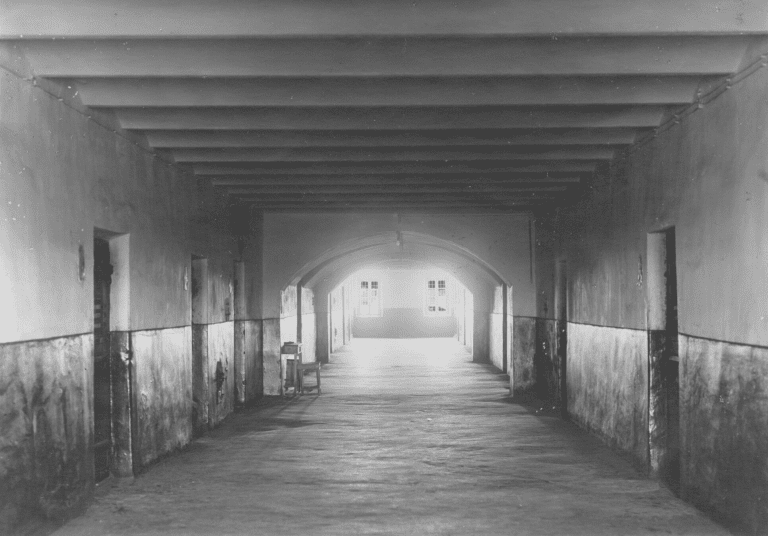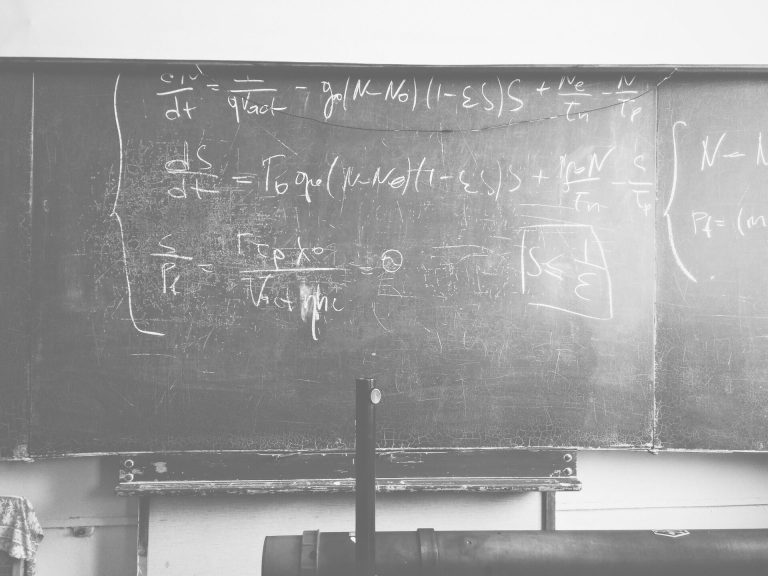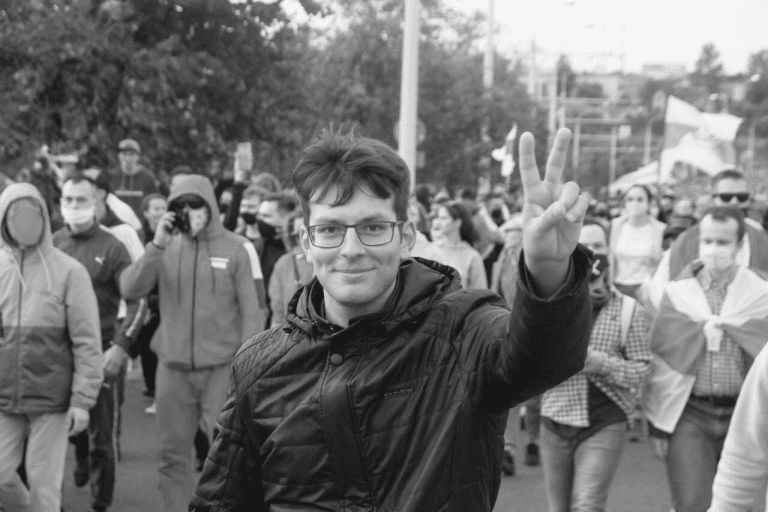I remember we were running away from the riot police down Nemiga street in the city centre, and suddenly my friend stops with the words: “I’m tired, damn it. Shall we have smoke?”. I mean, why not.
*”Alena”‘s name and personal details have been changed to protect her identity.
Before 2020, I wasn’t interested in politics. Everything changed that summer. Belarus woke up. Suddenly everyone started talking about the elections. For the first time we discussed the different candidates with friends, watched the interviews with them, argued which of them was truly democratic and which was a “protégé of Russia.”
On August 9, our families and neighbours went to vote for Sviatlana Tsikhanouskaya. The real democratic candidate. I remember the little ribbons that day the most. We knew the challenges the opposition faced so we all marked ourselves with white bracelets, ribbons or just bandages to make it easier for independent observers to count votes in exit polls.
The exit polls never came. Nor did the results. That night we waited and waited, but it was never revealed – the electoral commission was afraid to leave their offices.
The first rumours began to spread that in some polling stations they had counted fairly, and there Tsikhanouskaya had won by a huge margin. It seemed to me that we win. I thought that it might finally be over. I was wrong. Things changed, and very quickly.
That night the internet was shut down, you couldn’t go online, luckily you could call and send SMS. I called a friend, she was at a rally in the city centre of Minsk. The authorities had shut the city down, public transport was shut down, there were police everywhere.
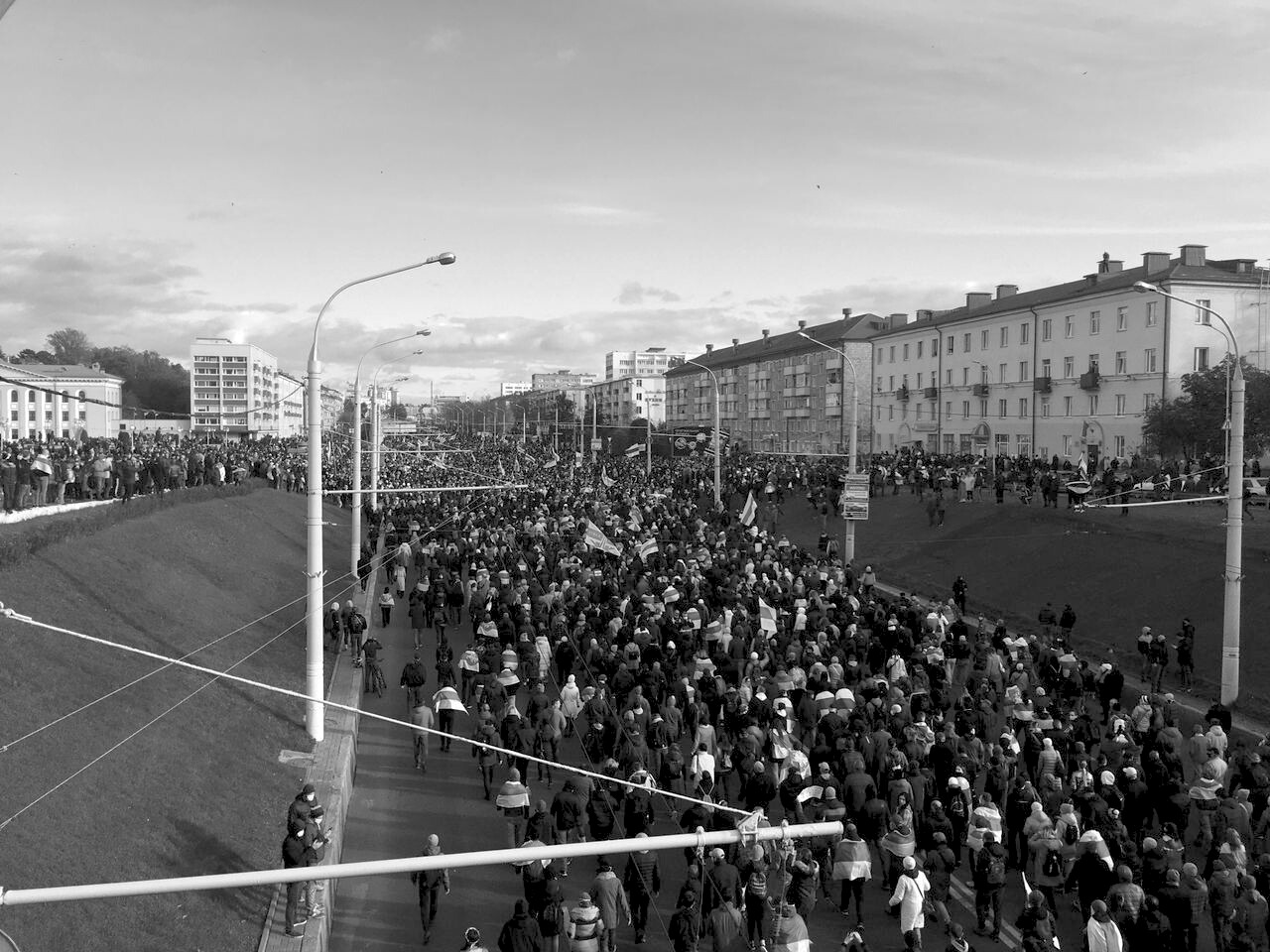
The next day everything escalated.
On the morning of August 10, I was woken up by a call from a friend who lived in a small town in the countryside. He’d called me to ask me what had happened in Minsk the night before. I knew nothing at that point, but I turned to the single independent channel on TV – I was shocked, it was flooded with footage of protesters resisting the police.
My whole family was in complete disbelief at what we were watching. No matter what, we felt great pride in the nation. By the time evening came I was already out in the city centre demonstrating with friends. Many metro stations were shut down, and the city was swarming with police.
At some point, riot police stopped us and told us to show our backpacks. Inside, luckily, we only had medical gloves, bandages, a badge with a white-red-white flag and a folding knife.
Suddenly, while travelling by bus, a very young OMON (riot police) officer asked us:
– “Are there any stupid thoughts in your head?”
Naturally, we answered no. They let us go.
That August in 2020 was a stream of never ending rallies, each full of happiness, fear, and a lot of running away from the police.
There were some ridiculous moments, but they are some of my happiest memories too that I will never forget. Once, I remember we were running away from the riot police down Nemiga street in the city centre, and suddenly my friend stops with the words:
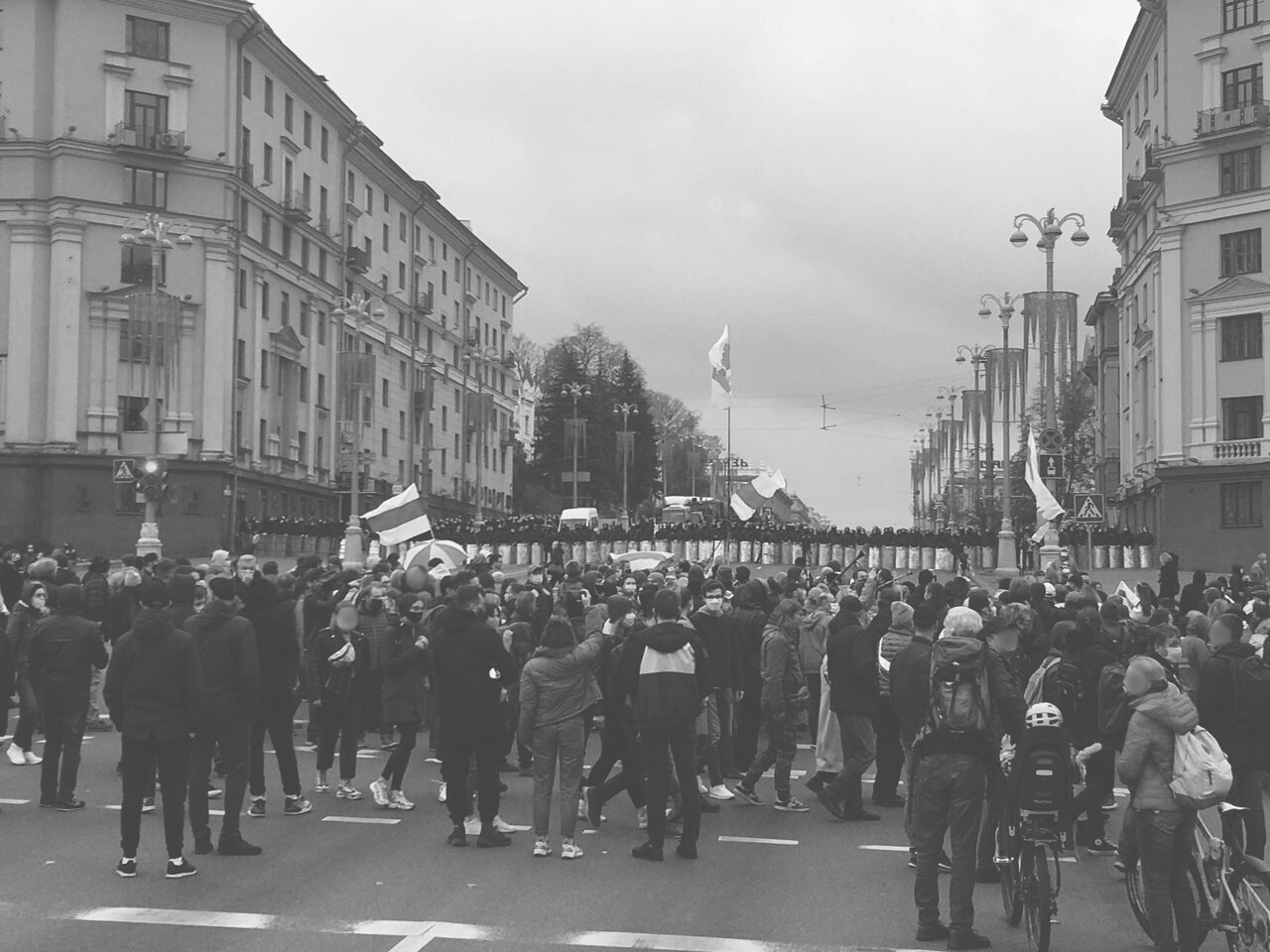
“I’m tired, damn it. Shall we have smoke?”.
I mean, why not?
Or how our friend really had to pee mid protest, but it was impossible to stop, the police were behind us. We ran into some unfamiliar yard and watched over him while he peed in the bushes.
In Belarus, the most popular messenger is Telegram. It’s very simple but crucially it allows you to create an anonymous account, and thus gives you a sense of security. You can also read news from various independent Belarusian media there – Radio Svaboda, Belsat, Nasha Niva. Before the start of the school year, many students began creating chats on Telegram. There we discussed what would happen next.
Just going to school on September 1 seemed wrong – the elections were stolen, those who disagreed were in prison, people were killed. It was in such chats that we met the future creators of the “underground” student organisation of medical students. We met in person for the first time in early September. We decided among ourselves what we could do: publish honest news about what is happening at the university, organise actions, initiate a collective appeal addressed to the rector against violence.
That was the first time in my life when I realised how much I lacked knowledge about how civil society works, what defending really human rights is. I was the youngest in our group and very naïve. I didn’t even realise the risks until a colleague spelt it out to me.
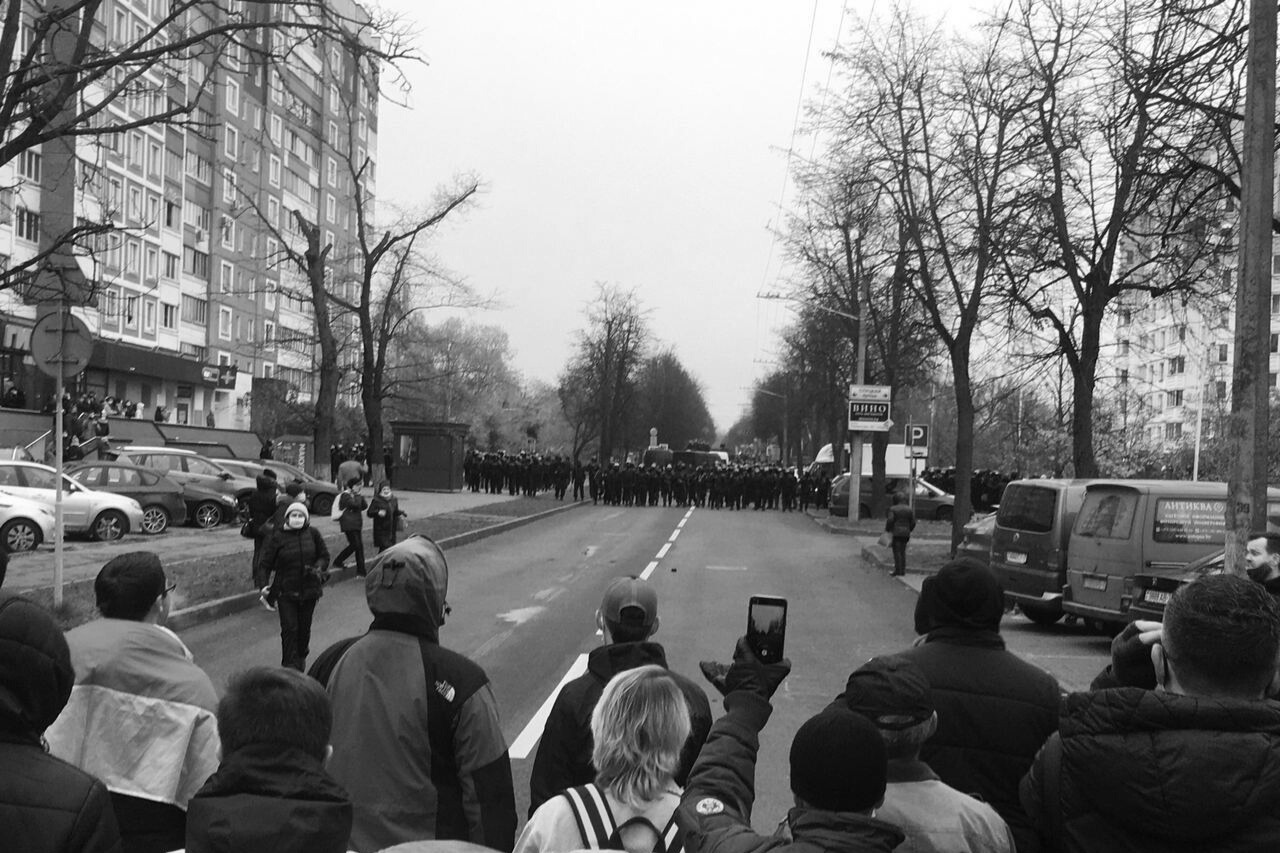
“We will all end up in prison anyway…”
Running away from the police became a skill all of its own. Throughout September we organised ‘chains of solidarity’ near the university to express our support for political prisoners. On the second one, on September 3, the Police came for us.
Seven minutes in, an old minibus with police arrived. They filmed us to identify all the participants later. Then they tried to get one student, but we defended him. We thought we got rid of them easily, but suddenly a bus with riot police arrived.
They started attacking; they didn’t care who they grabbed. They just charged at us. We started running towards the university, towards the main entrance. We were just a few metres from the door when a university security guard blocked the door. She smiled and held the door with all her might so that the police would catch us.

Her smile was disgusting.
Fortunately, we quickly found our bearings and ran into another building. Knowing the territory saved us. No one was detained that day.
It didn’t always end that positively. A week later some students were detained. After someone is detained, the first thing we’d do is determine which prison the person was taken to. So that night we called local police stations. We went to the courts, found lawyers who provided their services to the students for free.
We contacted the parents of the detainees and explained what happened. Some broke down crying instantly. We made sure they were supported and know what to do.
Then my university started to apply the pressure.
I was called to the dean’s office, I was informed that apparently medical students were not allowed to go to protests. It was apparently a disgrace to the honour of the white coat. They said they would start monitoring us. They claimed that they were concerned for us. Lies.
We weren’t going to let them control us. A few days later I was in class, and suddenly I was called to the rector’s office. I was called out right in the middle of my class, as was my friend. It didn’t take long to realise that they were calling all the participants of a rally the day before.
We went in groups, it was stupid to go alone, alone we could easily be broken. The rector did not expect this, it was clear that everything did not go according to plan – in the end we came out unbroken. Even by this point however no serious threats were dished out to us. That of course changed.
Throughout the autumn a network of student organisations grew. Every major university had a group of activists who took charge of organising protests. We all knew each other on the Internet using nicknames. Nobody knew real names. It was safer that way.
University administrations responded and bent to the pressure from the authoritarian regime. Each university invited a so-called “vice-rector for security.” No one doubted that these were KGB agents inserted to infiltrate and track down the activists.
We organised the largest student rally on October 26th – this day was later called the “student strike”. We gathered at the university, in the main building. We entered the lecture halls and chanted the usual slogans:
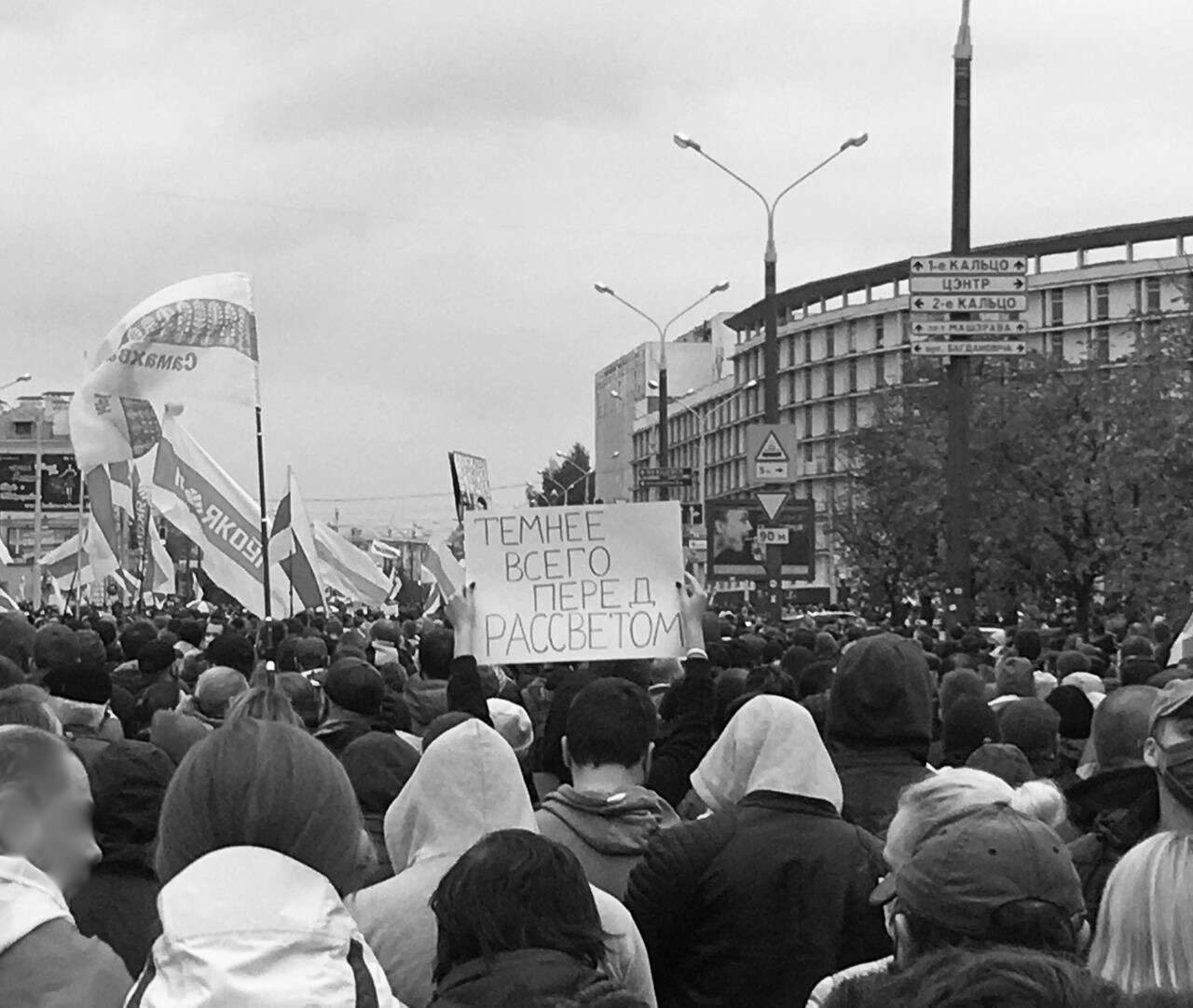
“Long live Belarus”, “We believe, we can, we win”.
Our fellow students stood up and walked out with us. There were teachers who supported us – they clapped and loved the fact that students were going to protest. Some chose to hide.
At some point the rector caught up with us. He shouted at us to stop disrupting classes, that we were breaking the law. The KGB vice-rector ran after him and threw himself at one of the students. But by this point we were over 200.
We left the university and went downtown to meet students from other universities. The route was mobile, that is, there was no precisely designated meeting point. We needed to avoid security services. We decided along the way.
While we were riding the metro, we had to think about which station would likely be riddled with police, and where it would be relatively safe to get off. We survived the Metro but our luck didn’t last.
After getting off the Metro we walked no longer than 10 minutes when we noticed buses coming towards us. Everyone scattered. Most of the people simply ran along the road. I, along with some others, ran into an open cosmetics store. There were two middle-aged saleswomen there, they allowed us to come in and locked the door. They were kind and said we could stay as long as needed.
But we had to go out to try to find our own people. They let us through the back door. Then we moved through courtyards and avoided major roads. There were riot police along the way, we either ran or walked calmly. We met other student groups several times and consulted on the best way to go. It was like nothing I’ve experienced before.
Few people made it to BSU courtyard, the meeting point for the rally. What an incredible feeling it was. New groups of students were greeted with applause and shouts.
There were already buses with riot police there. We did our best to resist them.
Many medical students were detained that day. They were released the next day with fines, but the university decided to expel all those detained. I was lucky.
We tried to defend our colleagues. For several days we protested outside the rector’s office until late in the evening, we wanted to defend the expelled students. We failed to get the expulsions overturned, but these days united us as a student community.
But the repression began to get worse and worse – the special police services were looking for activists. They didn’t hide it. They constantly detained medical students and asked them: “Who is the organiser? Who is administering this channel in Telegram?”
Detention became a matter of time.
I realised that I had to leave when the KGB began to show interest in one of the core organisers at my medical university.
At this time, the Second Faculty of Medicine of Charles University in Prague offered places for repressed medical students who could not safely continue their studies in Belarus or had been expelled. Fortunately, I was accepted into this program, and in April I moved to the Czech Republic. Since then I have been here and continue to study medicine.
